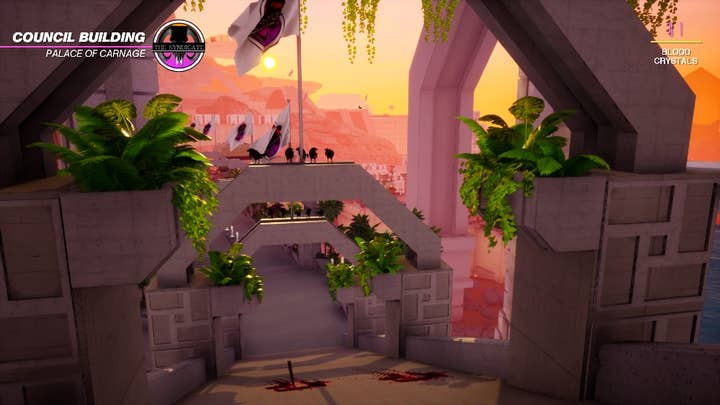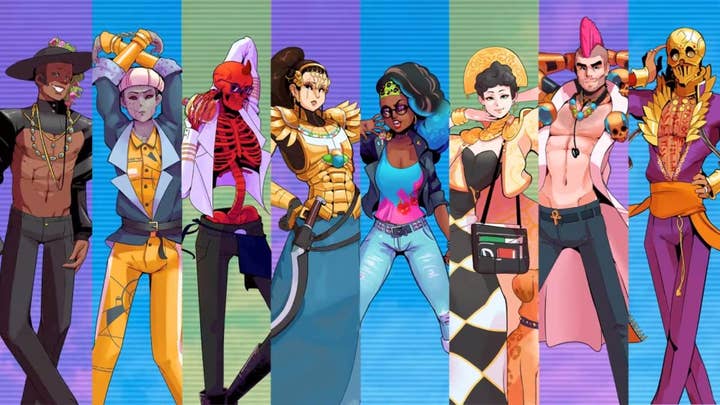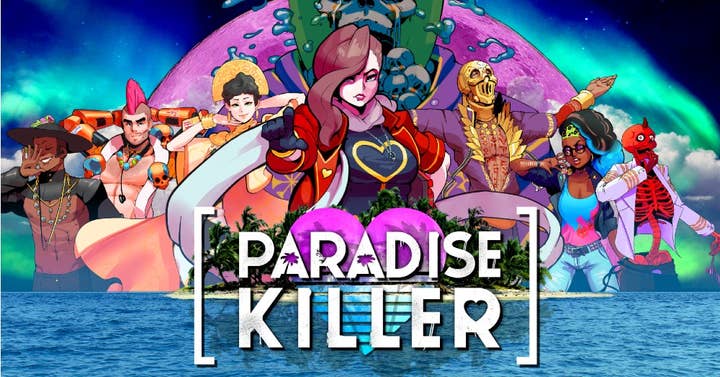Making weirdness work: The sun-drenched horror of Paradise Killer
Kaizen Game Works' Phil Crabtree discusses class struggle, city pop and madness from beyond the stars
Paradise Killer is, by its creators' own admission, "a weird game."
It's an open world murder mystery in which you must uncover who slaughtered the presiding council of an otherworldly paradise. Thematically, it exists in its own space: somewhere between Japanese investigation series Dangenrompa, the surrealism of Kafka, and the cosmic horror of H.P. Lovecraft, but "without all the scorching racism."
All the disparate parts of Paradise Killer presented as a pitch deck seem like they wouldn't work.
"We like big, bold character games," says the Paradise Killer studio Kaizen Game Works co-founder Phil Crabtree. "We like cosmic horror, and survival horror as well. We both like Japanese architecture, we both like city pop. And it's just, 'Why can't we put all those things together?' And perhaps foolishly, we just let ourselves do it."
"We like cosmic horror, survival horror, Japanese architecture, city pop - why can't we put all those things together?"
The game released in September to critical praise. Writing for IGN, Joe Skrebbles said: "Paradise Killer marries a beautifully repulsive world with a gratifyingly open-ended approach to detective work, but its real achievement is in how it ties everything you've learned together."
Crabtree says he almost fell out of his chair after the first reviews came in, and the reception was "way beyond" what they expected.
It's not hard to see why Crabtree might hold a few reservations about how the game would be received. The world of Paradise Killer is a queer-friendly, cosmic horror bonaza; a heady mix of sun-drenched Miami Beach paradise meets madness from beyond the stars. The lurid aesthetic and vibrant soundtrack is decidedly at odds with the traditional cosmic horror tropes of imposing libraries, fish-headed monsters, and gruff investigators.
When it comes to narrative design, weirdness without reason is a sin; bloated and irrelevant. But Paradise Killer -- rife with alien gods and blood sacrifices -- uses its distinctive weirdness to build a detailed world in which the central mystery unfolds. The inscrutable gods cast a millenia-long shadow over the island and its denizens, their twisted history serving as a backdrop for the "crime to end all crimes."
Kaizen wanted to create a world that is familiar, with rules the player can understand, while still being distinct from our own. Something that is recognisable, but strange enough to encourage rigorous exploration.
"When you start including all these kinds of cosmic gods, it opens up a mystery of what is this world and what can this world be?" says Crabtree. "A lot of games try to answer all the questions, and Paradise Killer doesn't.
"It lets you imagine, and the imagination is so powerful. We wanted to plant seeds of what this could be. By having the gods, it takes it out of this small island and into the greater world, the wider universe... It is a case of taking influence and just making it fit to serve the game. Everything's always there to serve the game."

The open world of Paradise Killer has a real sense of atmosphere, achieved effectively with desolate environments -- especially around the Citizen Apartments where the underclass of enslaved mortals eek out a meagre existence to a city pop soundtrack.
"I think the music is the one thing I was confident people would like," Crabtree jokes. "[Composer] Barry 'Epoch' Topping is someone we brought in partly with the UK Games Fund money. So we've got them to thank for that... [Topping] just knocked out the part every single time. And the fact that people have kind of picked up the music as being fantastic on its own without the game is wonderful."
"In most societies, there is a class struggle. We wanted that to be something that people can understand and rally against"
Despite its emptiness, Kaizen wanted the world to feel alive by littering it with artifacts and mementos of its previous inhabitants. "There's a certain level of things that you'll never find out because some things have to be left open to create that mystery and that drama," says Crabtree.
Bringing the world to life was a core design goal, as it allows the player to make their own judgements about both it, and the handful of characters involved. As an open-ended investigation game, Kaizen wanted to facilitate player freedom, presenting "story interaction over storytelling." The player is an active participant in the story, engaged in the central conflict between uncovering the facts and defining the truth.
This required layering thematic depth. By creating a fully realised world with its own history and culture, players can make informed decisions about how they want the story to unfold; whether that's attempting to pin certain crimes on characters you dislike, or finding ways of exonerating characters you do, despite their demonstrable guilt.
As you explore Paradise Killer, it becomes clear that -- by our conventional cultural standards -- Paradise is an aberration. While not "making a massive political statement," Paradise Killer is a reflection of its creators' beliefs when it comes to underlying anti-capitalist sentiments, and recognition of class struggle.
The world of Paradise Killer is one based on inequality and oppression, reflected in the desolation of the island itself -- which for its all fancies, is an abandoned husk. The only characters left on the island are suspects in the murder case, and all of its human denizens have been brutally killed in a ritual sacrifice to appease terrifying gods. Picking your way around the island there is a quiet sense of the people who lived there, and the hidden horrors they endured as part of their role in the island's machinery.
"Paradise Killer might be extreme, but in most societies, there is still a class struggle," says Crabtree. "And we wanted that to be something that people can understand and rally against."

However, Paradise Killer is not a horror game. At its core, it's a human story and a murder mysterty. Presenting bold, well-rounded characters was an important part of developing the game's appeal, but Crabtree says they also wanted to avoid common pitfalls of the investigation genre, such as its rigidity or penchant for big twists that undermines the player's work.
"A lot of games try to answer all the questions, Paradise Killer doesn't. It lets you imagine, and the imagination is so powerful"
"Never trick the player and always let them do whatever they want to do, whenever they want to do it," says Crabtree. "Those were probably the two most core principles, and it was difficult sticking to that. Really difficult. It throws up so many problems. But I think without them, Paradise Killer wouldn't be what it is... When you do choose to go to trial, it's because you've chosen it. And the outcome, whether you like it or not, you can see the correlation. We haven't hidden something from you. It's something you haven't found. And it's so important just to let it feel like they have been listened to in the game and their choices."
As a two person team, Crabtree says they were able to iterate and experiment "without endless meetings." For a game with so many strange and disparate elements, this was an indispensable boon.
"If you put something in that didn't work, it wasn't a massive waste of time. And vice versa, if we put something in that was working, we could build on it very quickly... A very immediate thought-to-game process."
While Crabtree admits they "lost contact" with the weirdness as release day approached, he also says the game might have fallen apart with a bigger team. "We very much went with the idea that if one of us can do something, and it feels right, then that's what we keep. "
Following the success of Paradise Killer, Kaizen has taken on a third member of staff and learned a few valuable lessons for its second game, namely doing more upfront design. Much of the design was done "on the fly" and fortunately worked out, but Crabree admits "it is risky" and "always a panic."
"If we'd taken five minutes to sit back and kind of think a bit more about some of the design, we could have saved time here and there," he concludes. "But it's not always true. If you always step back and talk about the design rather than just doing it, you might end up with nothing.
"We're definitely going to do a big, big postmortem of this and figure out what worked well for us, and understand how we can keep that going forward, because we love the game. We love the experience of making it, and we want to make sure we have that in the next game to be wonderfully cool."









